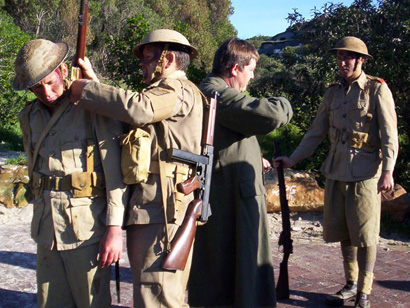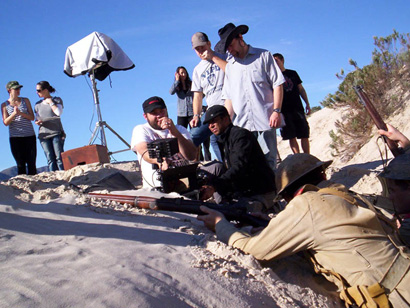By Jon Plowman
Ted asked me for this article last year. I agreed, because there are a couple of important points I’d like to put out there to encourage filmmakers in the same kind of position as I find myself. But before I could actually get around to writing the damn thing, I found myself retrenched. That’s “laid off” to most of you. I lost my job. Yeah, you know the one I mean, the one that actually pays the bills while I work on movies. My boss gave me a sob story about how he couldn’t afford to keep me on because the business was struggling. He has a wife and two small kids, and his business was their sole income. I couldn’t blame him. We feel the global recession here just as keenly as the US or Europe. So there I was, out on the street with R150 in my pocket. To put that in perspective, R1 = US$0.15, give or take.
Welcome to life as an indie film maker on the southern tip of Africa.

As an independent filmmaker in what – to most people who will have read this blog, is a foreign country – I can tell you that things in South Africa are much the same as anywhere else in the world. We do have some advantages over other filmmakers. We generally have a better (read: cheaper) pricing structure, making it reasonably cost effective to shoot a foreign-financed film here. In season, we have great weather. We also have interesting and varied landscapes, architecture and population, so we find the lion’s share of our income in the industry is from foreign investors who bring their movies to us to service, despite the fact that the movies are almost universally set back in their home countries. We also have a burgeoning South African film industry, and we are beginning to make a name for ourselves with our own home-grown directors – Gavin Hood (heard of him?) and our movies – Tsotsi, District 9, etc. Despite the fact that our industry is small and relatively young, we have huge amounts of talent and experience. And the smallness of the industry works to our advantage, because it’s easy to get to know all the right people.
Having said all that, where does independent filmmaking come into the equation? This brings me to my first point, and the main thrust of this first part of a two-part article on indie filmmaking.
Two years back, I was one of a small group of like-minded people who identified a niche in the local film industry that was crying out to be filled. So, as we say here in South Africa, we made a plan. I became one of the founding members of the South African Indie Films filmmaker’s collective, and we have an almost continuous stream of small-scale, zero-to-low budget independent films on the slate. Very few of us make money off the films, because we do it for the love of film and because we all have stories we want to tell. 99% of the people who work on our films are students, gifted amateurs, or people who work professionally in the industry, but – like me – are either “between employments”, are working in their spare time, or are looking for portfolio material and experience during the off-season. We realised that we’d found a gaping hole in the local film industry into which we seem to have slotted nicely. We’re based in Cape Town, but we have affiliations with like-minded filmmakers in Johannesburg and Port Elizabeth, and even in Namibia. When we started a SAIF Facebook group, we had acquired 150 members within 24 hours. Two years later we have almost 1,000 members. We’ve been approached by people from afar afield as the UK and Europe to read scripts, help find finance for their films, help them get their films made. We have a network of related groups focusing on different aspects of the film industry, and all of them are very active with news, casting calls, crew notices, trailers, forthcoming releases, film festivals, and so forth.

Social networking is an incredibly powerful, usually free tool for the modern filmmaker. Sites such as LinkedIn and Facebook – two of my personal favourites – are fast becoming an essential way to connect with industry people and extend your network. Used to your advantage, it can only be of benefit to you.
So that seems to be a workable solution. Whether you use social networking or not, find people who are like-minded, who have the same passion for film, the same drive to create and tell stories, and collaborate with them. Organise collectives and informal groups, meet over the weekends, club together for equipment and transport, utilise student filmmakers and actors who are keen to get involved – there never seems to be a shortage of available actors – and get out there and make films. If nothing else, for the people who have a real passion and want to make this a career, the experience and the networking will help in the future. And working with a group of other people on an informal basis helps to share costs and the logistical problems become much easier to deal with as experience increases. The down side is that if you’re not paying someone a salary, it’s hard to hold them to their commitments, but you find in the long haul that the people who are not really committed drop out and you’re left with a central core of people who are prepared to work hard with you to achieve the dream. There’s nothing more inspiring than working on a project with other passionate, creative people. It’s a drug that you’ll find you just can’t get enough of.
Jon’s Plowman’s a fairly typical of indie filmmakers in South Africa. He’s worked on more than 75 productions, everything from PSAs, student films and shorts, to commercials, television series and movies, and full-length internationally famous features such as Goodbye Bafana, Avenger and Blood Diamond. Last year he worked on the World War II film The Fallen, a short about South African soldiers’ contribution to the fighting in North Africa and which was a top 25 finalist in the International One Minute Film Festival. Since he lost his fulltime job, he’s been working on music videos and short films. He’s even been paid for some of them.
You can connect with Jon on Facebook: www.facebook.com/magscadar





